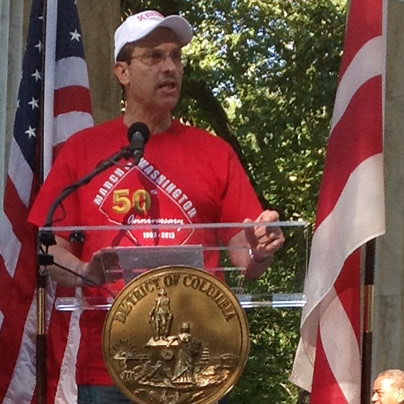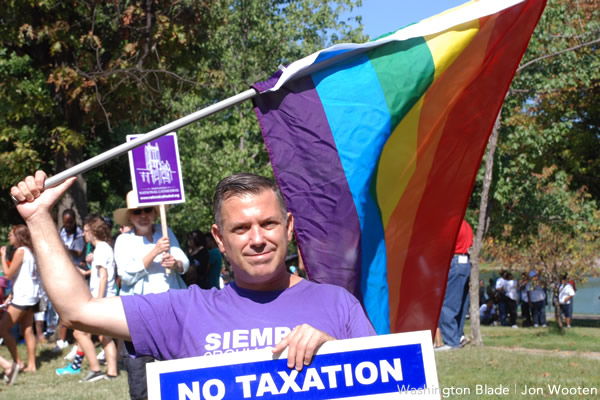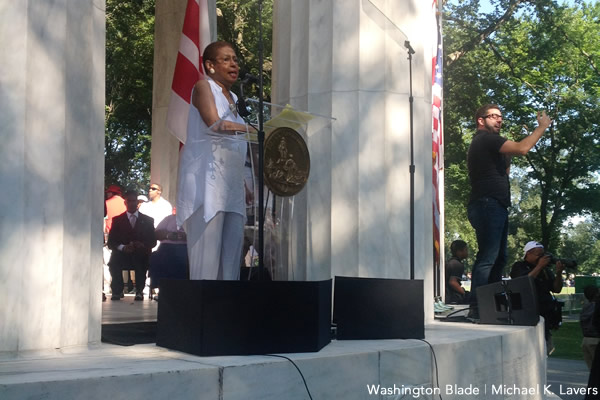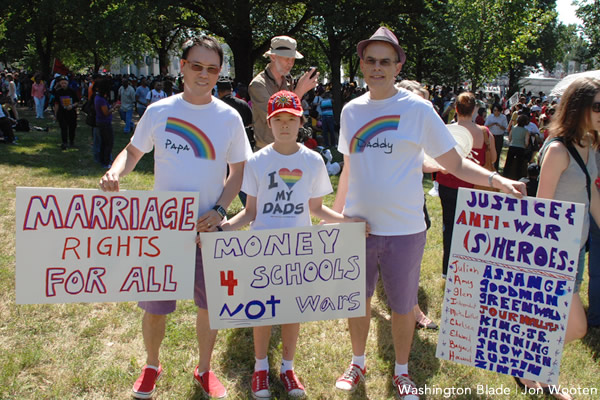National
LGBT March on Washington participants celebrate King legacy
Those who took part said civil rights leader would have backed gay rights


José Gutierrez, founder of the Latino GLBT History Project, at the National March on Washington (Washington Blade photo by Jon Wooten)
Liz Abzug, daughter of the late-former New York Congresswoman Bella Abzug who introduced the first federal gay rights bill in 1975, was 11-years-old when she and her mother attended the March on Washington in 1963.
She told the Washington Blade on Saturday her mother would have certainly returned to the Lincoln Memorial five decades later.
“She’d be up there speaking in the front,” Liz Abzug said as she stood with members of Congregation Beit Simchat Torah, an LGBT synagogue in New York City, on the National Mall. “She’d be screaming and speaking and charging up and thrilled, but saying we have unfinished business.”
Liz Abzug is among the LGBT rights advocates who joined the tens of thousands of people who commemorated the 1963 march during which Martin Luther King, Jr., delivered his famous “I Have a Dream” speech.
American Federation of Teachers President Randi Weingarten; National Black Justice Coalition Executive Director Sharon Lettman-Hicks, Rev. MacArthur Flournoy of the Human Rights Campaign; Service Employees International Union President Mary Kay Henry and Adrian Shanker, president of Equality Pennsylvania, are among those who joined Rev. Al Sharpton, NAACP President Benjamin Jealous and others at the Lincoln Memorial. New York City Council Speaker Christine Quinn and members of the National Gay and Lesbian Task Force, Equality Maryland, the Gay and Lesbian Community Center of Baltimore, the Latino GLBT History Project and other LGBT groups also took part.
“I’m here with my brothers and sisters, not only in the union movement, but with LGBT people, with African Americans from the civil rights movement,” Suzanne Keller of Richmond, Va., told the Blade as she stood along the reflecting pool in front of the Lincoln Memorial with her girlfriend who was 13-years-old when she watched the 1963 March on Washington on television. “I know I’m here with my people.”
Lance Chen-Hayes of Princeton, N.J., held a sign in support of marriage rights for same-sex couples and affordable health care as he stood on the Mall with his husband, Stuart Chen-Hayes, and their son Kalani. Stuart Chen-Hayes cited a list of people whom he considers heroes that include Bayard Rustin, who organized the 1963 March on Washington, and former U.S. Army private Chelsea Manning whom a military judge on Wednesday sentenced to 35 years in prison for leaking classified documents to Wikileaks.
“If we don’t stand up, speak up and be in the streets, who will,” Stuart Chen-Hayes told the Blade. “It’s especially important for us who are lesbian, gay, transgender and parents because there’s all sorts of folks who fought for us 50 years ago and long before that. It’s just continuing the struggle for civil rights and human rights.”
Anders Minter, a gay man who is a member of the United Auto Workers, traveled to the nation’s capital from Amherst, Mass. to attend the march.
He told the Blade he felt “incredible power and solidarity” while marching, but noted what he described as a “great tension.”
“It’s been 50 years since we’ve come together as a country with a focus on economic justice and social justice,” Minter said, noting the commemoration of the 1963 March on Washington took place against the backdrop of June’s U.S. Supreme Court decision that struck down a crucial portion of the Voting Rights Act and last month’s acquittal of George Zimmerman in the 2012 shooting death of Florida teenager Trayvon Martin. “It’s been a long journey, but there’s a long journey ahead.”
D.C. officials used the march to highlight the issue of statehood for the nation’s capital.
D.C. Mayor Vincent Gray noted during a pro-statehood rally at the D.C. War Memorial near the Mall that people of “different sexual orientations and genders” were among those who attended the 1963 March on Washington.
“We’re demanding justice because justice is exactly what we are here to accomplish,” he said.
D.C. Council Chair Phil Mendelson (D-At-Large,) D.C. Council members Jack Evans (D-Ward 2,) Muriel Bowser (D-Ward 4,) Marion Barry (D-Ward 8,) Vincent Orange (D-At-Large,) Anita Bonds (D-At-Large) and David Grosso (I-At-Large) and D.C. Police Chief Cathy Lanier are among those who also attended the pro-statehood rally.
Roland Martin, a former CNN commentator whom the network suspended in 2012 over homophobic tweets he sent during that year’s Super Bowl, also spoke.

D.C. Congressional Del. Eleanor Holmes Norton speaks at a pro-D.C. statehood rally at the D.C. War Memorial on Aug. 24, 2013. (Washington Blade photo by Michael K. Lavers)
“This morning we serve notice as the March on Washington 2013 begins that we, who have fewer rights than almost any who will march today, can no longer allow the deliberate disempowerment and denial of our rights to go unnoticed, unnoted, unmentioned and ignored,” D.C. Congressional Del. Eleanor Holmes Norton, who helped to organize the 1963 March on Washington, said. “No more marches and ignoring D.C.”
King understood rights are ‘not divisible’
Many of the march participants with whom the Blade spoke said they feel King would have supported LGBT rights if he were still alive.
“His message of equality, his message of inclusion of all people was loud and clear in everything that he wrote and every speech that he gave,” Grosso said.
“We’re humans and everybody deserves the same rights,” Daniel Trejo of Columbia Heights told the Blade as he prepared to march to the Lincoln Memorial with the D.C. Office on Latino Affairs.
Minter referenced King’s “I Have a Dream” speech as he discussed how he feels the slain civil rights leader would have backed LGBT rights.
“Martin Luther King was an incredible listener, as much as he was an incredible orator,” Minter said. “Part of acceptance and love is listening and understanding and I think he would have added this to his work.”
Both Liz Abzug and Keller noted to the Blade the slain civil rights leader’s widow, Coretta Scott King, backed marriage rights for same-sex couples before she passed away in 2006.
“Dr. King had a key understanding that rights are not divisible,” Keller said. “If we don’t have human rights for everybody, we don’t have human rights for anybody.”
National
Supreme Court deals blow to trans student privacy protections
Under this ruling, parents are entitled to be informed about their children’s gender identity at school, regardless of state protections for student privacy.

The Supreme Court on Monday blocked a California policy that allowed teachers to withhold information about a student’s gender identity from their parents.
The policy had permitted California students to explore their gender identity at school without that information automatically being disclosed to their parents. Now, educators in the state will be required to inform parents about developments related to a student’s gender identity, depending on how the case proceeds in lower courts.
The case involves two sets of parents — identified in court filings as John and Jane Poe and John and Jane Doe — both of which say their daughters began identifying as boys at school without their knowledge, citing religious objections to gender transitioning.
The Poes say they only learned about their daughter’s gender dysphoria after she attempted suicide in eighth grade and was hospitalized. After treatment for the attempt and after being returned to school the following year, teachers continued using a male name and pronouns despite the parents’ objections, citing California law. The Poes have since placed their daughter in therapy and psychiatric care.
Similarly, the Does say their daughter has intermittently identified as a boy since fifth grade, but while their daughter was in seventh grade, they confronted school administrators over concerns that staff were using a male name and pronouns without informing them. The principal told them state law barred disclosure without the child’s consent.
Both sets of parents filed lawsuits in the U.S. District Court for the Southern District of California challenging the state policy that protects students’ gender identity and limits when schools can disclose that information to parents.
The justices voted along ideological lines, with the court’s six conservative members in the majority and the three liberal justices dissenting.
“We conclude that the parents who seek religious exemptions are likely to succeed on the merits of their Free Exercise Clause claim,” the court said in an unsigned order. “The parents who assert a free exercise claim have sincere religious beliefs about sex and gender, and they feel a religious obligation to raise their children in accordance with those beliefs. California’s policies violate those beliefs.”
In dissent, the three liberal justices argued that the case is still working its way through the lower courts and that there was no need for the high court to intervene at this stage. Justice Elena Kagan wrote, “If nothing else, this Court owes it to a sovereign State to avoid throwing over its policies in a slapdash way, if the Court can provide normal procedures. And throwing over a State’s policy is what the Court does today.”
Conservative Justices Samuel Alito and Clarence Thomas indicated they would have gone further and granted broader relief to the parents and teachers challenging the policy.
The emergency appeal from a group of teachers and parents in California followed a decision from the United States Court of Appeals for the Ninth Circuit that allowed the state’s policy to remain in effect. The appeals court had paused an order from U.S. District Judge Roger Benitez — who was nominated by George W. Bush — that sided with the parents and teachers and put the policy on hold.
The legal challenge was backed by the Thomas More Society, which relied heavily on a decision last year in which the court’s conservative majority sided with a group of religious parents seeking to opt their elementary school children out of engaging with LGBTQ-themed books in the classroom.
California Attorney General Rob Bonta expressed disappointment with the ruling. “We remain committed to ensuring a safe, welcoming school environment for all students while respecting the crucial role parents play in students’ lives,” his office said in a statement.
The decision comes as the Trump administration has taken a hardline approach to transgender rights. During his State of the Union address last week, President Donald Trump referenced Sage Blair, who previously identified as transgender and later detransitioned, describing Blair’s experience transitioning in a public school. According to the president, school employees supported Blair’s chosen gender identity and did not initially inform Blair’s parents.

Last year, the court upheld Tennessee’s ban on gender-affirming medical care for transgender minors and has allowed enforcement of a policy barring transgender people from serving in the military to continue during Trump’s second term.

The Comings & Goings column is about sharing the professional successes of our community. We want to recognize those landing new jobs, new clients for their business, joining boards of organizations and other achievements. Please share your successes with us at [email protected].
Congratulations to Gil Pontes III on his recent appointment to the Financial Advisory Board for the City of Wilton Manors, Fla. Upon being appointed he said, “I’m honored to join the Financial Advisory Board for the City of Wilton Manors at such an important moment for our community. In my role as Executive Director of the NextGen Chamber of Commerce, I spend much of my time focused on economic growth, fiscal sustainability, and the long-term competitiveness of emerging business leaders. I look forward to bringing that perspective to Wilton Manors — helping ensure responsible stewardship of public resources while supporting a vibrant, inclusive local economy.”
Pontes is a nonprofit executive with years of development, operations, budget, management, and strategic planning experience in 501(c)(3), 501(c)(4), and political organizations. Pontes is currently executive director of NextGen, Chamber of Commerce. NextGen Chamber’s mission is to “empower emerging business leaders by generating insights, encouraging engagement, and nurturing leadership development to shape the future economy.” Prior to that he served as managing director of The Nora Project, and director of development also at The Nora Project. He has held a number of other positions including Major Gifts Officer, Thundermist Health Center, and has worked in both real estate and banking including as Business Solutions Adviser, Ironwood Financial. For three years he was a Selectman, Town of Berkley, Mass. In that role, he managed HR and general governance for town government. There were 200+ staff and 6,500 constituents. He balanced a $20,000,000 budget annually, established an Economic Development Committee, and hired the first town administrator.
Pontes earned his bachelor’s degree in political science from the University of Massachusetts, Dartmouth.
Kansas
ACLU sues Kansas over law invalidating trans residents’ IDs
A new Kansas bill requires transgender residents to have their driver’s licenses reflect their sex assigned at birth, invalidating current licenses.

Transgender people across Kansas received letters in the mail on Wednesday demanding the immediate surrender of their driver’s licenses following passage of one of the harshest transgender bathroom bans in the nation. Now the American Civil Liberties Union is filing a lawsuit to block the ban and protect transgender residents from what advocates describe as “sweeping” and “punitive” consequences.
Independent journalist Erin Reed broke the story Wednesday after lawmakers approved House Substitute for Senate Bill 244. In her reporting, Reed included a photo of the letter sent to transgender Kansans, requiring them to obtain a driver’s license that reflects their sex assigned at birth rather than the gender with which they identify.
According to the reporting, transgender Kansans must surrender their driver’s licenses and that their current credentials — regardless of expiration date — will be considered invalid upon the law’s publication. The move effectively nullifies previously issued identification documents, creating immediate uncertainty for those impacted.
House Substitute for Senate Bill 244 also stipulates that any transgender person caught driving without a valid license could face a class B misdemeanor, punishable by up to six months in jail and a $1,000 fine. That potential penalty adds a criminal dimension to what began as an administrative action. It also compounds the legal risks for transgender Kansans, as the state already requires county jails to house inmates according to sex assigned at birth — a policy that advocates say can place transgender detainees at heightened risk.
Beyond identification issues, SB 244 not only bans transgender people from using restrooms that match their gender identity in government buildings — including libraries, courthouses, state parks, hospitals, and interstate rest stops — with the possibility for criminal penalties, but also allows for what critics have described as a “bathroom bounty hunter” provision. The measure permits anyone who encounters a transgender person in a restroom — including potentially in private businesses — to sue them for large sums of money, dramatically expanding the scope of enforcement beyond government authorities.
The lawsuit challenging SB 244 was filed today in the District Court of Douglas County on behalf of anonymous plaintiffs Daniel Doe and Matthew Moe by the American Civil Liberties Union, the ACLU of Kansas, and Ballard Spahr LLP. The complaint argues that SB 244 violates the Kansas Constitution’s protections for personal autonomy, privacy, equality under the law, due process, and freedom of speech.
Additionally, the American Civil Liberties Union filed a temporary restraining order on behalf of the anonymous plaintiffs, arguing that the order — followed by a temporary injunction — is necessary to prevent the “irreparable harm” that would result from SB 244.
State Rep. Abi Boatman, a Wichita Democrat and the only transgender member of the Kansas Legislature, told the Kansas City Star on Wednesday that “persecution is the point.”
“This legislation is a direct attack on the dignity and humanity of transgender Kansans,” said Monica Bennett, legal director of the ACLU of Kansas. “It undermines our state’s strong constitutional protections against government overreach and persecution.”
“SB 244 is a cruel and craven threat to public safety all in the name of fostering fear, division, and paranoia,” said Harper Seldin, senior staff attorney for the ACLU’s LGBTQ & HIV Rights Project. “The invalidation of state-issued IDs threatens to out transgender people against their will every time they apply for a job, rent an apartment, or interact with police. Taken as a whole, SB 244 is a transparent attempt to deny transgender people autonomy over their own identities and push them out of public life altogether.”
“SB 244 presents a state-sanctioned attack on transgender people aimed at silencing, dehumanizing, and alienating Kansans whose gender identity does not conform to the state legislature’s preferences,” said Heather St. Clair, a Ballard Spahr litigator working on the case. “Ballard Spahr is committed to standing with the ACLU and the plaintiffs in fighting on behalf of transgender Kansans for a remedy against the injustices presented by SB 244, and is dedicated to protecting the constitutional rights jeopardized by this new law.”
-

 India5 days ago
India5 days agoActivists push for better counting of transgender Indians in 2026 Census
-

 Advice5 days ago
Advice5 days agoDry January has isolated me from my friends
-

 District of Columbia5 days ago
District of Columbia5 days agoCapital Pride reveals 2026 theme
-

 National5 days ago
National5 days agoAfter layoffs at Advocate, parent company acquires ‘Them’ from Conde Nast


















